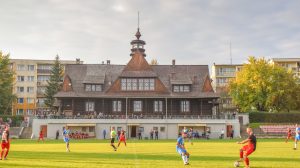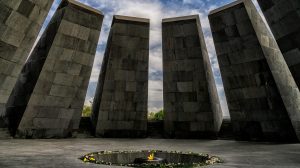After more than five years and four months in Russian detention, Oleg Sentsov, a Ukrainian filmmaker and native Crimean, was finally able to pick up his well-deserved Sakharov Prize. The prestigious human rights award was given to him by the European parliament in 2018, for all he has done in his fight for his fellow Ukrainians.
“Oleg is a fighter by nature,” Mr Sentsov’s cousin, Natalya Kaplan, said about him in the European Parliament a year ago.
The parliament was in full session, but the Ukrainian filmmaker could not attend. He was arrested, during the turbulent events staged by pro-Russian forces in Crimea in the spring of 2014, for “plotting a terrorist attack” on the peninsula’s new rulers, together with other Ukrainian detainees who were protesting against Crimea’s annexation. To the great shock of both Ukraine and the international community, the Russian courts found him guilty of terrorism and sentenced him for 20 years in prison, where he was denied re-investigation and faced the threat of torture.
Throughout the past years, he has been sent from one infamous Russian prison to another. In 2017, he was reportedly transferred to Russia’s northernmost detention centre, in Yamalo-Nenets, a place where he declined family visits, saying that visitors “fall into a terribly deep depression” after they leave.
In 2018, Mr Sentsov, who has always stood against Russia’s illegal rule in Crimea, went on a hunger strike for 145 days, demanding that the Kremlin release every Ukrainian political prisoner that had been captured in the Donbas war or detained on trumped-up charges by the pro-Russian Crimean authorities. Although no prisoners were released, his actions were not in vain.
“Thanks to his action, the whole world is talking about Russian repressions: this is a victory,” Natalya told members of the European Parliament, when her cousin was awarded the prize, last December.
At long last, Mr Sentsov, who has become a world symbol of Russia’s modern-day aggression, was released, on September 7, in the first – and so far only – major prisoner swap between Russia and Ukraine.
“I have not lost a single day in prison. I always knew that we would win, I always knew we would be set free,” he told Hromadske in his first interview, after his release. “There were difficult moments when it was very hard, but they were rare, short-lived and no one saw them. So, I tried to think positively, and to maintain a positive attitude inside myself,” he continued.
After receiving his award, on November 26, in Strasbourg, he called it a prize for all Ukrainian political prisoners and soldiers, who are fighting for the freedom of their country.
“Currently a lot is being said about negotiations and possible peace with Russia. I don’t trust [Russian president Vladimir] Putin and I call upon you not to trust him either. Russia will absolutely cheat you (…). They want to see Ukraine on its knees. We won’t allow this. We will fight for our freedom and we will fight until the end.”
According to him, Europe sets a great example, and he noted that there is a country, which is “the greatest Euro-optimist in the world – Ukraine.”
“For us, this is a question of survival as a nation,” he said, when reflecting about his country’s future.
“So, every time any of you wonder about how to be friendly with Mr Putin, over our heads, please remember the thousands of those who have fallen in Ukraine. Please remember the hundreds of our young men, who are still behind bars,” he told the MEPs. He also called on them to remember Crimea’s long suffering Tatar community, who are being systematically abused by the Russian authorities, and those Ukrainian soldiers who are risking their lives, even today.
“Thank you! Glory to Ukraine,” he concluded his speech, before receiving a standing ovation in the European Parliament and the respect of all Europe.
“Too many defenders of freedom are forced to be afraid of losing their lives or of never seeing their families again, because they are unwilling to comply and remain silent in the face of human rights’ violations,” the European Parliament’s president, David Sassoli, addressed his fellow lawmakers during the ceremony, and noted that although Mr Sentsov has been released, many others, including Stanyslav Aseev, a Ukrainian journalist, are is still being held hostage in Eastern Ukraine.
Named after Russian scientist, political dissident and peace activist Andrey Sakharov, the European Parliament’s Sakharov Prize honours outstanding individuals and organizations who have dedicated their lives to protecting freedom of thought and defending human rights.
Photo: European Parliament





Add Comment